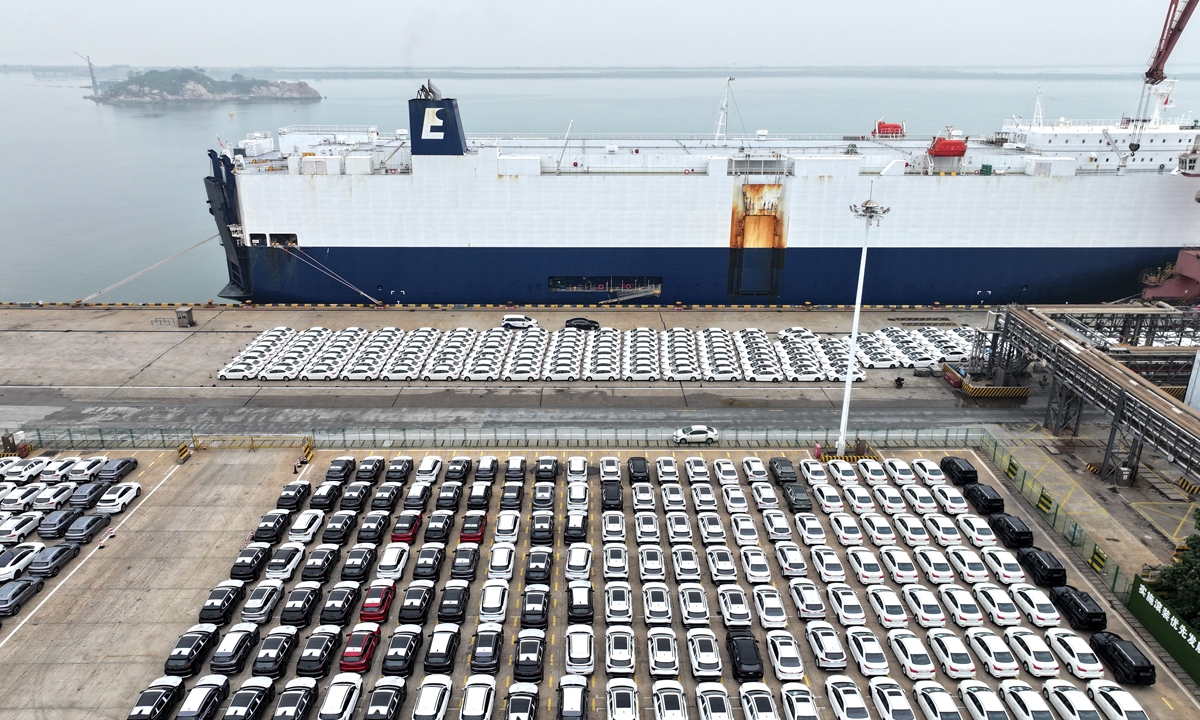
A cargo ship docks at a berth to load export vehicles at a terminal of Lianyungang Port in East China's Jiangsu province on July 11, 2024. China has exported about 485,000 cars to the world. Photo: VCG
The main Chinese business group in the EU has slammed the bloc's protectionist move against Chinese electric vehicles (EVs) for creating market panic and uncertainty, after Chinese EVs' share of newly registered EVs in the EU surged.
Separately, a Chinese automaker said on Wednesday that it has not made substantial progress in talks with Italy for potentially building a plant in the EU country, amid strict requirements.
The latest developments underscore the fact that the EU's tariffs against Chinese EVs have begun to have a negative impact on not just EV exports to the EU but also the EV market within the bloc. If the EU continues on the wrong path of protectionism, more profound damage is expected, analysts said on Wednesday.
As the China-EU dispute over the latter's EV tariffs continues, changes to market conditions have been put under the microscope. The share of Chinese EVs among newly registered EVs in the EU reached 12.4 percent in June, compared with 10.4 percent a year earlier - a finding that drew widespread attention among foreign media outlets.
In response to the data, the China Chamber of Commerce to the EU (CCCEU) said that the change most likely reflected fluctuations created by the EU's plan to impose additional tariffs on Chinese EVs.
"The data also highlight the nervousness and uncertainty in European markets caused by the EU's protectionist measures," the CCCEU said in a statement shared with the Global Times on Wednesday.
Moreover, the EU's move has had a significant negative impact on normal trade between China and the EU, the CCCEU said. In June, China's EV exports to the EU dropped more than 30 percent to 27,180 units.
Sun Yanhong, a senior research fellow at the Institute of European Studies of the Chinese Academy of Social Sciences, said that the rise in Chinese EVs' share in the EU in June reflected concerns among EU consumers ahead of the additional tariffs, and the drop in Chinese EV exports to the EU showed that Chinese EV makers have been discouraged by the EU's protectionist action.
"The EU's protectionism will delay the bloc's transition toward green development," Sun told the Global Times on Wednesday, "and many lower-income consumers will not be able to afford EVs because the biggest advantage of Chinese EVs is affordability, compared with those of EVs made in the EU."
In addition to the impact on EV trade, the EU's protectionism has also created uncertainty for Chinese EV makers' investment plans in EU member countries. Bloomberg reported on August 9 that Italy has demanded Chinese carmaker Dongfeng Motor Group agree to safeguards on cybersecurity and data protection as the price of support for a new plant in the country.
However, Dongfeng told the Global Times on Wednesday that the two sides only held initial talks and have not made any substantive contacts. "Dongfeng has not held discussions on issues mentioned in foreign media reports, including cybersecurity, data protection and 45 percent localization rate of all components," the company said in a statement sent to the Global Times.
The CCCEU also said that the negative impact of the EU's so-called investigation on bilateral EV trade, bilateral relations and global joint efforts to combat climate change is becoming increasingly prominent.
"Both Chinese and EU EV companies embrace and look forward to greater cooperation. We hope that the EU policy environment will be more conducive to promoting cooperation between the Chinese and EU industries," the CCCEU said.
China and the EU have held more than 10 rounds of consultations over the EU's additional tariffs against Chinese EVs. China has initiated dispute settlement proceedings against the EU's moves. The move is conducive to protecting the Chinese firm's legitimate rights and interests, addressing trade disputes and safeguarding the fairness of international trade, the CCCEU said.
Warning of further damage if the EU continues on the wrong path, Chinese analysts urged the EU to resolve the dispute through dialogue and stop its protectionist actions.
"The negative impacts are predictable. But if the EU continues to ignore such negative impacts on the market, and continues on its current path, there will be persistent negative effects on the EU's entire EV market," Cui Hongjian, a professor at Beijing Foreign Studies University's Academy of Regional and Global Governance, told the Global Times on Wednesday.
In pushing ahead with the additional tariffs against the opposition of member countries and EU industries, the European Commission has abandoned economic and trade principles and has instead focused on so-called security issues in resolving trade disputes, Cui said.




